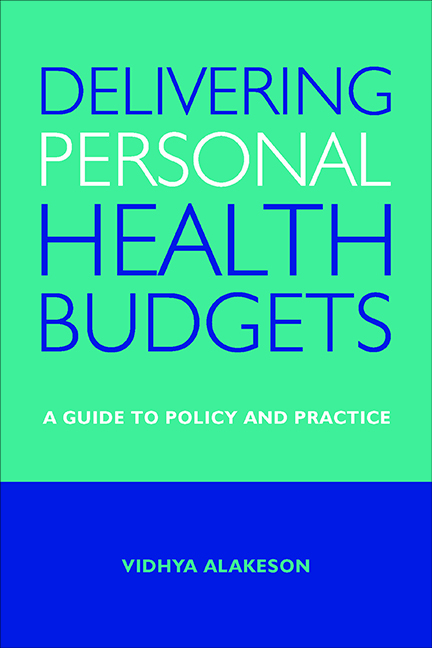Book contents
- Frontmatter
- Contents
- List of tables and figures
- Acknowledgements
- Prologue: Stephen’s story
- Introduction
- Section 1 Introducing personal health budgets
- Section 2 Implementing personal health budgets
- Section 3 Personal health budgets and organisational change in the NHS
- Conclusion
- Epilogue: Jonathan’s story
- References
- Index
eleven - Doctor does not know best: a changing role for clinical professionals
Published online by Cambridge University Press: 03 February 2022
- Frontmatter
- Contents
- List of tables and figures
- Acknowledgements
- Prologue: Stephen’s story
- Introduction
- Section 1 Introducing personal health budgets
- Section 2 Implementing personal health budgets
- Section 3 Personal health budgets and organisational change in the NHS
- Conclusion
- Epilogue: Jonathan’s story
- References
- Index
Summary
We have already discussed how PHBs are a new tool for creating a more equal relationship between individuals and clinical professionals in which each contributes their own expertise in a genuine process of co-production. For occupational therapists and social workers familiar with self-directed support in social care, the change in working practice that PHBs require is not dramatic. For the majority of clinical staff in the NHS, however, PHBs represent a fundamentally different way of working from the way in which they were trained and traditionally practice. Care coordinators working in CHC in Manchester described the change in practice required to work with PHBs as at least an eight if not a ten out of ten, where ten represents a complete culture change.
The first dimension of that culture change is that PHBs start with the individual and balance what is important to that individual with what is important for their health. Traditional clinical practice starts with symptoms and diagnosis and rarely gets to know the mother, employee or music lover in the background. Pat Deegan eloquently describes how her diagnosis of schizophrenia quickly became her identity:
And that diagnosis took on what I call a master status in terms of my identity. The fact that I was Pat, that there were many aspects to who I was as a person became absolutely irrelevant. Once I held this label, this diagnosis, what mattered was that I was a ‘schizophrenic’. (Deegan, 2008)
Second, working in partnership with individuals requires clinicians to make decisions with, rather than for, people. This demands the skills of a health coach such as motivational interviewing and decision support counselling rather than conventional consultation skills, as Dr Greg Rogers discusses in his clinician's viewpoint on page 98 (Bennett et al, 2010). Third, PHBs start with an indicative budget and developing a care plan involves knowing how much different options cost. Few clinicians have experience of talking about money in their clinical practice, and many feel uncomfortable doing so. Finally, PHBs change the composition of the workforce, with independent support brokers and peers taking over roles previously performed by clinicians, creating fears about job losses and a tendency to defend the status quo.
- Type
- Chapter
- Information
- Delivering Personal Health BudgetsA Guide to Policy and Practice, pp. 123 - 134Publisher: Bristol University PressPrint publication year: 2014



